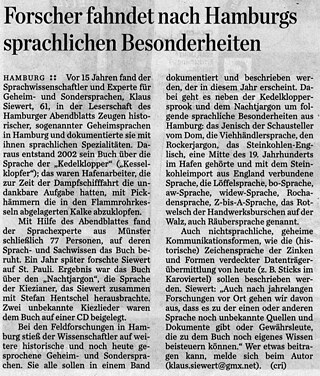Hamburg has a lot to offer when it comes to special and secret languages. Klaus Siewert uncovers the latest sources and provides insights into the communication styles of sailors, showmen, and other nocturnal figures.
In the winter camp on an Elbe island in Hamburg Moorfleet, within the coach of a Yenish family, we encounter the Yenish language of the showmen. Schockfreiersprache is their self-description, the internal name used by the showmen in Hamburg. The term combines the Jewish-German word Schock (fair, market) and the Rotwelsch word Freier (man, boy), referring to the owners of various rides and stalls, as well as their employees and families. Unlike most other German secret languages, Schockfreier language was spoken by everyone involved in fairground life. The community of speakers included women, children, and employees of the Schockfreier. The language was often used to deceive visitors at fairgrounds such as the Hamburger Dom.Money transactions
An interview with Achim D. and his wife begins:“What was the function of this language? Was it used against third parties to exclude them from communication? What do you think of that?”
“It was used, of course, so that a stranger wouldn't hear it. So that you could possibly take advantage of them in certain transactions and so on. And when I say: der Sege het Lobi, that means ‘the man has money’, so we can raise the prices. That was the whole point.”
“Hol mal den Seges aus der Spiene, der soll figine machen! = Get the bloke out of the pub, he should drive up the price (a third-party friend who appears as a supposed prospective buyer).
Che fini, der gatsch kneist et schon = Stop it, the man in the back is already looking over. Nasch krig, die klistos kommen! = Get out of here quickly, the police are on their way!”
“Can you think of any other words that are missing from our list?”
“A ten-penny piece is a Pachen. Heitach was a fifty-penny piece. Schockstock was a one-mark piece. Beischock was two marks. Then comes the Heiamann, then the Jutmann, then the Halbe, and then the Schein.”
“Were there also names for things that were particularly important at the fairs?”
“A children's merry-go-round is a Kindermühle (children’s mill), a Hängemühle (hanging mill) is a hanging merry-go-round, a small one on which children ride. A Russe (Russian) is a Russian wheel or a Ferris wheel. A Flieger (flyer) is a swing ride. Auf und Ab (up and down) is a Babyflug (lit. ‘baby flight’, a children's merry-go-round with aeroplanes that go up and down). Rakete (rocket), Schrägkarussell (inclined merry-go-round), Schlickerbahn – that's a Großglocknerbahn (a type of slanted merry-go-round).
Language mix
We leave the Elbe island in search of other special Hamburg languages.
The Hamburger Abendblatt supports the search, which continues in 2015 | (HAB 5 March 2015)
Travelling craftsmen later brought the language to the Hanseatic city. In addition to the nocturnal jargon, it is also the language of the St. Pauli rockers, who occasionally like to Putz suchen, Terz machen or auf die Klötze hauen: Blowing up dance events, smashing up pubs, starting fights, sometimes accompanied by provocations like: Willst Putz haben?! Du meinst wohl, du bist King?! Du glaubst wohl, du bist Elvis?! Spuck nicht, Alter! Mach keinen Spruch! Bist du gehirnschwanger?!
Setz dich mal mit’m nackten Arsch auf ’ne Kreissäge und sag mir dann, welcher Zahn zugestochen hat! Du ziehst original keinen Hering vom Teller, geschweige denn ’ne Gräte!
(Do you want trouble?! You think you’re king?! You think you’re Elvis?! Don’t spit, mate! Don’t make a comment! Are you brain-twisted?!
Sit down with your bare arse on a circular saw and tell me which tooth has stuck! You can't pull a herring off a plate, let alone a bone!)
Mysteriously alienated
In addition to this dark communication, there were various languages in Hamburg which, like Kedelkloppersprache, alienated the text as a whole by means of a specific coding key—and were therefore suitable for secret languages, even if they only arose from playing with language. Elsewhere, spoon-speaking was widespread. A speaker born in 1935 remembers and greets with a mischievous smile: Guhulefu tenhenlefen tachachlefach. Meaning: Guten Tag (Goodhoodlefood dayhaylefay – Good day)! The alienation is achieved by inserting an artificial sequence of sounds into each word. After the war, the spoon language was spoken among girls and boys in the area of the main railway station, 'among friends on the street,' but not in the family or at school.Kannst Du das? – Mag sein.
Kannsthannstlefannst Duhulefu dashaslefas? – Maghaglefag seinheinlefein.
(Can you do that? – Maybe.
Canhanlefan youhoulefou doholefo that-hatlefat? – Mayhaylefay behelefe)
The aw and widew languages are similar to the spoon language. In the case of bo and robber language, we find the pattern of alienation in Astrid Lindgren’s “Bill Bergson”:
“Ei non Hoh o choch dod e non Ror o tot e non Ror o sos e non,” said Sixten with some effort. “Actually, it’s a terribly simple language when you think about it.” “Yes, you can say that now that you know the trick,” said Anders. “And besides, you still need to learn to speak it much, much faster,” said Kalle. “Yes, not one letter today and another tomorrow,” teased Eva-Lotta. “The Rors have to rattle off quickly!” They were all sitting on the bakery floor, all the knights of the White and Red Rose, and the Reds had just received their first lesson in the robbers’ language.
Last chance
At the end of our field research in Hamburg, we return to the university with a rich haul: linguistic data and sound recordings of secret languages that once existed, such as nocturnal jargon no, Kedelkloppersprook, or Schockfreiersprache. We were lucky: the last speakers and guarantors were still alive. Back in the ivory tower, we were overwhelmed with certainty: if we had not met them, the linguistic and cultural-historical knowledge associated with them and their special and secret languages would probably have been lost forever.In the final part of our journey through the world of secret language communication, we will examine the repressive political systems of Germany's recent past and finally take a look at the future.
Word! The Language Column
Our column “Word!” appears every two weeks. It is dedicated to language – as a cultural and social phenomenon. How does language develop, what attitude do authors have towards “their” language, how does language shape a society? – Changing columnists – people with a professional or other connection to language – follow their personal topics for six consecutive issues.
December 2024
